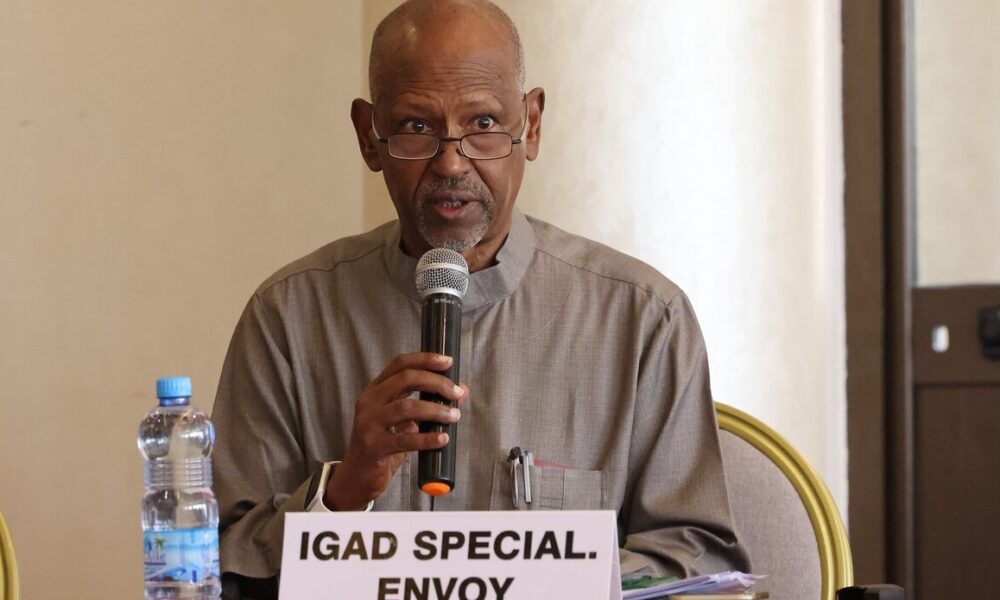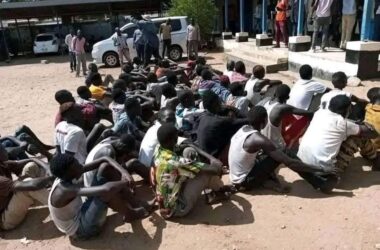By Philip Buda Ladu
Regional peace partners on Tuesday issued a stricken warning that South Sudan’s fragile peace process is on the verge of collapse.
Citing ongoing military confrontations creating “tremors of an impending explosion”, that it threatens to plunge the nation back into full-scale war.
Speaking during urgent consultations in Juba, representatives from the Intergovernmental Authority on Development (IGAD), the African Union Mission in South Sudan (AUMISS), and the United Nations Mission in South Sudan (UNMISS) expressed grave concerns over escalating violence and political instability.
“The peace process, a process we have all invested in, now hangs by a thread,” declared Ismail Wais, Special Envoy for IGAD. He lamented that the ceasefire, the bedrock of the 2018 revitalized peace agreement, has been violated by “continued attacks and clashes between peace partners.”
In its press statement issued in Tuesday the peace partners echoed that the renewed military offensives, including aerial bombardments, have already displaced over 130,000 people in Upper Nile and Jonglei, exacerbating a dire humanitarian crisis where three-quarters of South Sudanese are in need of aid and protection, and 7.7 million face acute food insecurity.
“These are not mere warning signs; they are the tremors of an impending explosion,” Mr. Wais emphasized.
The tripartite Peace guarantors also highlighted the deeply concerning trend of unilateral dismissals and appointments to political posts, deeming them clear violations of the power-sharing agreement. The arrest of key peace partners, including the First Vice President, was cited as a major factor in escalating tensions, eroding trust, and deepening divisions among supporters and communities.
Joram Biswaro, Head of AUMISS, urged the main signatories to the revitalized agreement to “start re-examining themselves. What went wrong, where, and what is to be done.”
The partners issued a collective call for an immediate cessation of hostilities and a return to an inclusive, nationally driven peace process to ensure the legitimacy and effective implementation of the peace agreement.
“There is a need to rebuild public trust in national political leadership within the revitalized framework as we continue to stress the need to resolve conflicts by dialogue rather than force, and to avoid a relapse into full-scale conflict,” stated Guang Cong, Deputy Special Representative of the United Nations Secretary-General (Political).
He also expressed hope for “inclusive, appropriate and credible representation in the unity Government.”
Meanwhile, there is growing fear that without rapid political decisions and actions to implement critical outstanding benchmarks in the peace agreement, yet another extension of the transitional period and delayed elections are inevitable.
Hassan Robleh, Ambassador of Djibouti to South Sudan and Chair of IGAD, underscored the urgency: “The people of South Sudan have waited too long for peace. Their resilience deserves our collective action together with determination and unity.”
He concluded with a powerful plea stating: “We must ensure that December 2026 marks, not just an election, but a new chapter for hope and stability.”
The people of South Sudan are renowned for their patience, resilience and persistence in pursuing the peace and democracy they were promised when their leaders signed a landmark revitalized agreement in 2018.
But the hopes that were once so high are being shattered.
“The peace process, a process we have all invested in, now hangs by a thread,” said the Special Envoy for the Intergovernmental Authority on Development (IGAD), Ismail Wais. “The ceasefire, the backbone of the peace agreement, has been violated as continued attacks and clashes between peace partners threaten to plunge the nation back into full-scale war.”
Speaking during consultations on the crisis held in Juba today, regional peace partners expressed a shared concern that another dark chapter is looming as military offensives, including aerial bombardments, displace more than 130,000 people in Upper Nile and Jonglei, and exacerbate an already dire humanitarian situation, with three-quarters of South Sudanese needing aid and protection, and 7.7 million acutely food insecure.
“These are not mere warning signs they are the tremors of an impending explosion,” said Mr. Wais.
He stressed that unilateral dismissals and appointments to political posts are clear violations of the power-sharing agreement and that the arrest of key peace partners, including the First Vice President, have significantly escalated tensions, further eroded trust, and deepened divisions among supporters and communities.
“The key ones, the main signatories to the revitalized agreement, should start re-examining themselves. What went wrong, where, and what is to be done,” said the Head of the African Union Mission in South Sudan (AUMISS), Joram Biswaro.
The partners issued a collective call for a cessation of hostilities and return to an inclusive, nationally driven peace process to ensure legitimacy and effective implementation of the peace agreement.
“There is a need to rebuild public trust in national political leadership within the revitalized framework as we continue to stress the need to resolve conflicts by dialogue rather than force, and to avoid a relapse into full-scale conflict,” said the Deputy Special Representative of the United Nations Secretary-General (Political), Guang Cong. “We also express our hope for inclusive, appropriate and credible representation in the unity Government.”
There is fear that, unless the necessary political decisions and actions are taken to rapidly implement critical outstanding benchmarks in the peace agreement, yet another extension of the transitional period and delayed elections are inevitable.
“The people of South Sudan have waited too long for peace. Their resilience deserves our collective action together with determination and unity,” said the Ambassador of Djibouti to South Sudan, Hassan Robleh, speaking as the Chair of IGAD.
“We must ensure that December 2026 marks, not just an election. but a new chapter for hope and stability.”




